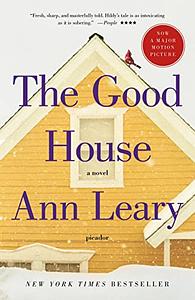Take a photo of a barcode or cover
A really enjoyable read, about halfway through I knew it was an "I love this one" kind of book!
Great book! A good bird's eye view into the mind of an alcoholic; one has to wonder if Leary isn't in recovery herself.
Please visit my blog to read my full review: https://ivoryowlreviews.blogspot.com/2019/11/the-good-house-by-ann-leary.html
The Good House is one of those books that has been hanging around on my shelf for years. I initially grabbed it because it popped up on some lists for books about witches, though when I read the summary I wasn't sure exactly how.
The Good House is one of those books that has been hanging around on my shelf for years. I initially grabbed it because it popped up on some lists for books about witches, though when I read the summary I wasn't sure exactly how.
Hildy is officially one of my favorite characters. Ann Leary crafted her so realistically and tangible- and I absolutely loved the narrator!
Hildy is a tough character. On the one hand, she is witty and talented. She is caring, knowledgeable and not afraid of hard work. When she is sober, she is an admirable lady that one would be proud to have as a mother or friend. Unfortunately, it is her neediness that is painful to witness because she is the type of woman who thrives in the company of others. Watching her slide downward into old patterns, the very same patterns that forced her daughters to send her rehab in the first place, is bittersweet, especially when it is so easily avoidable. At the same time, one wants to condemn her because she is ultimately responsible for her own actions, and her continuous justifications for her behavior become disturbing.
All of Hildy’s problems stem from her loneliness. Her embarrassment over past actions, her loneliness, her struggling business, her friendship with Rebecca and strained relationships with the rest of her hometown are all caused by her drinking. The Good House excels at showing how detrimental alcoholism is to every facet of a person’s life. It also shows just how easy it is for one to slip into a cycle of self-pity caused by drinking caused by self-pity and so forth. Hildy does not intend for her behavior to cause so many problems, but they do because she is stuck in a pattern from which she cannot break free. That she is an ultimately good person with plenty to offer society and no ill will towards others strikes a chord with readers because she makes it easy to imagine something similar happening to other loved ones.
The Good House is simultaneously intense and funny and horrifying. Hildy means well, but her denial about the true extent of her alcoholism is terrifying. Her downward spiral into the world of blackouts and lost time is made even scarier by her inability to recognize her harmful behavior and her willingness to get behind the wheel. At the same time, the fact that Hildy seeks solace from her loneliness and her work-related problems via a bottle is something to which a large number of readers can relate. One cannot condone her behavior but can understand how such extreme behavior starts. Meanwhile, her burgeoning relationship with Frank is hilariously sweet. The Good House proves that one is never too old to find love or to start again as many times as necessary.
All of Hildy’s problems stem from her loneliness. Her embarrassment over past actions, her loneliness, her struggling business, her friendship with Rebecca and strained relationships with the rest of her hometown are all caused by her drinking. The Good House excels at showing how detrimental alcoholism is to every facet of a person’s life. It also shows just how easy it is for one to slip into a cycle of self-pity caused by drinking caused by self-pity and so forth. Hildy does not intend for her behavior to cause so many problems, but they do because she is stuck in a pattern from which she cannot break free. That she is an ultimately good person with plenty to offer society and no ill will towards others strikes a chord with readers because she makes it easy to imagine something similar happening to other loved ones.
The Good House is simultaneously intense and funny and horrifying. Hildy means well, but her denial about the true extent of her alcoholism is terrifying. Her downward spiral into the world of blackouts and lost time is made even scarier by her inability to recognize her harmful behavior and her willingness to get behind the wheel. At the same time, the fact that Hildy seeks solace from her loneliness and her work-related problems via a bottle is something to which a large number of readers can relate. One cannot condone her behavior but can understand how such extreme behavior starts. Meanwhile, her burgeoning relationship with Frank is hilariously sweet. The Good House proves that one is never too old to find love or to start again as many times as necessary.
Good read overall, despite being another not-so-flattering depiction of psychiatrists.
had the potential to be SO good, but the narrator drove me nuts. she is interesting on the surface, and then all the interesting aspects of her life go nowhere. her blackouts were annoying, the other townspeople were far more interesting, and, while I finished it, I was hoping for more the entire time.
The narrator of this audiobook really brought Hildy to life, and I listened to it every chance I could. Hildy is a real estate agent in a wealthy New England town, divorced, mother and grandmother, and in denial about her alcoholism. All of these aspects of her life collide when she makes a new friend in town and life gets more complicated. Hildy's role as the unreliable narrator just really pulled me in.
I was lucky enough to get an advance reader copy of this book. And then, because I'm a fair kind of guy, I waited until everyone *else* had a copy to read it.
I enjoyed Ann Leary's style, I loved the setting, of course, and it made me slightly homesick, throughout. It's set in a fictional town on the north shore of Massachusetts, God's own country. While she did an excellent job giving an idea of the area and habits of inhabitants of areas like these, at times it felt a little heavy-handed. But perhaps that's me. I know what a regular coffee is at a Dunks. I feel like this should be an ingrained part of every human soul on the planet, something that everyone understands intrinsically. But I could be wrong. She also leans a little hard (or is that 'hahd'?) on the colloquial spellings for the locals, and I suppose it's been a general national trend for the last few years to point out that, hee-eeeey, people from the Northeast and in and around Boston talk differently, sometimes. Hell, my own daughter, born down the road in a non-fictional north shore town, is obsessed with how daddy and his parents say things.
But I got past all that stuff and got sucked into this story of Hildy Good, the witch's descendent with a penchant for reading people and selling houses. And drinking. When I wasn't enjoying the story and getting sucked along like detritus from a 747 that was ripping apart at the seams an inconvenient distance from the ground, I often had thoughts that the Leary household must either be one gigantic alcoholic mess of a party, 24/7, or it must be 100% totally dry. Between "The Good House" and Ann's husband's show Rescue Me, about an alcoholic, recovering alcoholic, no, no, plain alcoholic fireman, I feel as if I could get a contact buzz off the sheer volume of liquor and wine being consumed between the two stories.
And why not? Ann certainly has plenty to celebrate with this pretty well wrought story about a fictional town in the loveliest place on earth.
I enjoyed Ann Leary's style, I loved the setting, of course, and it made me slightly homesick, throughout. It's set in a fictional town on the north shore of Massachusetts, God's own country. While she did an excellent job giving an idea of the area and habits of inhabitants of areas like these, at times it felt a little heavy-handed. But perhaps that's me. I know what a regular coffee is at a Dunks. I feel like this should be an ingrained part of every human soul on the planet, something that everyone understands intrinsically. But I could be wrong. She also leans a little hard (or is that 'hahd'?) on the colloquial spellings for the locals, and I suppose it's been a general national trend for the last few years to point out that, hee-eeeey, people from the Northeast and in and around Boston talk differently, sometimes. Hell, my own daughter, born down the road in a non-fictional north shore town, is obsessed with how daddy and his parents say things.
But I got past all that stuff and got sucked into this story of Hildy Good, the witch's descendent with a penchant for reading people and selling houses. And drinking. When I wasn't enjoying the story and getting sucked along like detritus from a 747 that was ripping apart at the seams an inconvenient distance from the ground, I often had thoughts that the Leary household must either be one gigantic alcoholic mess of a party, 24/7, or it must be 100% totally dry. Between "The Good House" and Ann's husband's show Rescue Me, about an alcoholic, recovering alcoholic, no, no, plain alcoholic fireman, I feel as if I could get a contact buzz off the sheer volume of liquor and wine being consumed between the two stories.
And why not? Ann certainly has plenty to celebrate with this pretty well wrought story about a fictional town in the loveliest place on earth.






